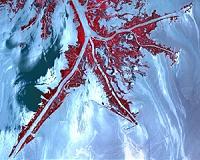| . |  |
. |
New Orleans (AFP) July 18, 2010 Three sport fishermen guided their boat up a oil-stained Louisiana coastline in a hopeful if tentative show of optimism, just days after BP finally capped the broken well in the Gulf of Mexico. The trio expressed a commonly heard, guarded optimism that after three months after the start of the Gulf oil spill, the worst environmental disaster in US history might finally be in check. "(The capping) is the first positive sign since the beginning (of the spill)" said David Frantz, 27, of New Orleans, as he guided the trio's boat up a ramp from Lake Pontchartrain, the northern border of the city. His father, Steve Frantz, stood dock-side holding a line to the boat, envisioning years of wetlands restoration on the hurricane-prone coastline. "You still have to stop the oil from coming into the marshes and you have to monitor the effects of the (oil) dispersants on seafood," the elder Frantz said." If all goes well, BP plans to keep the ruptured oil well in the Gulf of Mexico shut in until an operation to finally "kill" it begins at the end of July, said the company's chief operating officer Doug Suttles. "We're hopeful that if the encouraging signs continue we'll be able to continue the integrity test all the way to the point where we get the well killed," Suttles said Sunday. He told journalists that BP is planning an operation to finally plug the runaway well with heavy drilling fluids and then cement it. That operation is due to get underway at the end of July once a relief well has been finished and is expected to take until mid-August to complete. Fisherman Steve Frantz celebrated that BP finally had put an end to the flow of oil into the Gulf, but said the end of the leak does not necessarily mean the end of the crisis. "I don't know if we've seen the worst yet. If a storm comes, it will ruin everything we've done so far for protection (of the wetlands)." The third fisherman, Guy Valvis, founder of a charitable fishing "rodeo" cancelled by the oil spill, said he hopes area waterways will recover in time to host the annual scholarship fundraiser for auto repair students at a New Orleans area community college. For three months, millions of gallons of crude have spewed into the Gulf from a subsea well pipe, after a fiery explosion killed 11 men aboard the Deepwater Horizon April 20, sinking the drilling rig. Since then, BP and the US Coast Guard have attacked the undulating oil spill with nearly two million gallons of controversial dispersants, underwater robots, offshore containment "burns" and an armada of more than 6,000 vessels. Oiled birds, dolphins and turtles have smothered or drowned. State and local officials across five Gulf states -- Texas, Mississippi, Alabama, Florida and hardest-hit Louisiana -- have scrambled for absorbent boom to protect fragile marshlands or sandy beaches. Louisiana Governor Bobby Jindal said the state economy suffered an additional setback May 27 when the Obama administration ordered a six-month moratorium on deepwater drilling in the Gulf until safeguards were in place to prevent a repeat of the Deepwater Horizon disaster. Oil service companies and the Obama Administration are locked in a court battle over the drilling ban. The offshore oil and gas industry employs 35,000 workers in Louisiana. On Saturday, "Billy" Nungesser, the elected president of Plaquemines Parish, south of New Orleans, and a frequent critic of both BP and the coast guard, told AFP that he hopes Obama administration officials will "come to their senses" and lift the drilling ban. As an alternative to the drilling ban, Nungesser has proposed putting federal marshals on all 33 rigs. The federal marshals would have the authority to shut down any drilling rig deemed unsafe. Nungesser also seemed determined to enjoy the capping, at long last, of the spewing oil well, which meant that for the first day on Saturday "we took more oil out of the Gulf than was being let in to the water." "We see a light at the end of the tunnel even though it's a very long tunnel," he said, warning: "The oil is going to be coming ashore for a long time."
Share This Article With Planet Earth
Related Links Our Polluted World and Cleaning It Up
 Experts fear long oil effect on marine life, food chain
Experts fear long oil effect on marine life, food chainWashington (AFP) July 18, 2010 Scientists studying the massive BP oil spill fear a decades-long, "cascading" effect on marine life that could lead to a shift in the overall biological network in the Gulf of Mexico. With some 400 species estimated to be at risk - from the tiniest oil-eating bacteria to shrimp and crabs, endangered sea turtles, brown pelicans and sperm whales - experts say the impact of oil and chemical d ... read more |
|
| The content herein, unless otherwise known to be public domain, are Copyright 1995-2010 - SpaceDaily. AFP and UPI Wire Stories are copyright Agence France-Presse and United Press International. ESA Portal Reports are copyright European Space Agency. All NASA sourced material is public domain. Additional copyrights may apply in whole or part to other bona fide parties. Advertising does not imply endorsement,agreement or approval of any opinions, statements or information provided by SpaceDaily on any Web page published or hosted by SpaceDaily. Privacy Statement |